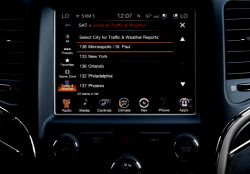— A Chrysler hacking lawsuit still hasn't been certified as a class-action as the automaker continues to battle the plaintiffs in court.
The lawsuit goes back to 2015 when three named plaintiffs accused Fiat Chrysler (FCA US) of selling Jeeps at risk of being taken over by hackers who use the Harman Kardon infotainment systems to enter the vehicles.
Specifically, the proposed class-action lawsuit includes all consumers who purchased or leased FCA vehicles equipped with Uconnect 8.4A or Uconnect 8.4AN systems that were recalled in the July 2015.
The 2015 recall involved the following models:
- 2013-2015 Dodge Viper
- 2013-2015 Ram 1500, 2500 and 3500
- 2013-2015 Ram 3500, 4500, 5500
- 2014-2015 Jeep Grand Cherokee and Cherokee
- 2014-2015 Dodge Durango
- 2015 Chrysler 200, Chrysler 300
- 2015 Dodge Charger
- 2015 Dodge Challenger
The lawsuit alleges the recall of 1.4 million vehicles doesn't protect the vehicles from being taken over remotely by hackers because all Chrysler did was update the software.
The recall occurred after media reports about a Jeep Cherokee driver who lost control of the SUV through a planned experiment by white hat (friendly) hackers who took control of the acceleration, air conditioning system, radio, windshield wipers and other systems.
FCA says the hacking of the Jeep Cherokee is a special case because it was carried out by professional researchers with plenty of money to carry out the experiment, but even more importantly, the hackers had physical access to the Jeep.
The automaker also references a federal investigation by the National Highway Traffic Safety Administration that concluded the fix provided during the recall closed any potential hacking vulnerabilities of the vehicles.
The plaintiffs are trying to convince the judge to certify the lawsuit as a class-action, but FCA says the lawsuit shouldn't exist in any form since the plaintiffs can't show they were harmed or injured by a defect.
Chrysler says the plaintiffs make it sound as if the vehicles are worthless and dangerous, yet the owners can't provide any evidence they even checked the value of the vehicles after the recall. This is a sticking point because the plaintiffs claim they wouldn't have purchased their vehicles if they would have known of any potential hacking vulnerabilities.
According to FCA, the plaintiffs must not be too worried about the problem because they continue to drive the vehicles they are allegedly so worried about. Chrysler says this is just one small example why there shouldn't be a class-action lawsuit of any kind about the Uconnect systems.
In addition, the automaker says none of the plaintiffs claim their vehicles were hacked or what vulnerabilities even exist.
According to FCA, the recall to fix any potential hacking problems did its job because not one single vehicle has been hacked since the recall. Although the plaintiffs claim the recall doesn't protect the vehicles, Chrysler argues there is no evidence for such a stance.
Chrysler further alleges it shouldn't be named in the lawsuit because customers bought the vehicles from dealers, not direct from the manufacturer (FCA). But the plaintiffs say buying from franchised dealerships creates a relationship that includes the company that built the vehicles.
As for customers who bought their vehicles from third parties, FCA says those consumers have no valid claims.
On top of all that, attorneys for FCA also claim the owners didn't let the automaker know they intended to file the lawsuit, a violation of Illinois law.
The Chrysler hacking lawsuit was filed in the U.S. District Court for the Southern District of Illinois - Flynn, et al. v. FCA US LLC, et al.
The plaintiffs are represented by the Law Office of Christopher Cueto, and Armstrong Teasdale LLP.

